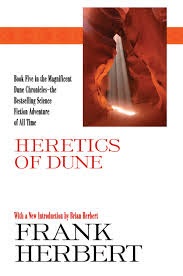 |
| 2.5 out of 5 stars |
Now, the Lost Ones are returning home in pursuit of power. And as factions vie for control over the remnants of the Empire, a girl named Sheeana rises to prominence in the wastelands of Rakis, sending religious fervor throughout the galaxy. For she possesses the abilities of the Fremen sandriders-fulfilling a prophecy foretold by the late God Emperor...
I do love the Dune universe, but I usually limit my re-reading to the first three books. The fourth book, God Emperor of Dune, is definitely the worst of the bunch, in my opinion, and yet I’m glad I read it long, long ago so that I knew what the main characters in Heretics were talking about! (Not enough to re-read God Emperor, mind you.)
Things I like in this book? Miles Teg, beloved Bashar and Atreides descendent and his interesting development in the last chapters. Yet another Duncan Idaho ghola, but this one seems to have a better grip on existence than the last several hundred of them. Plus, more insight into the world of the Bene Gesserit. Sheeana, the little minx on Arrakis/Rakis who has defied the Priesthood and has ridden the great sand worms, because really what is a Dune book without sand worm riding?
Things that make me scratch my head: The extreme weight given to sex in this book—really? I mean sex is nice and all, but it can be lived without fairly easily. Although individual people can be yanked around by their gonads, I don’t think whole societies can be warped or controlled through sexuality. Except now that I say that I’m thinking about modern marketing and imagining that people’s consumerist lives are definitely manipulated by sexuality in advertising. Hmmmm…. I suppose it’s the opposite of most of the dystopia books, where the human sexual drive provides the cracks that start the destruction of the evil order. In the Dune universe, it is resistance to sexuality that is rebellious.
Then there’s the whole issue of the Bene Gesserit and the Honored Matres being two very influential groups of women, bent on controlling the universe through sex. Mr. Herbert did not have a very flattering view of women, did he? When the men in the novel have sex, well they are just fulfilling a natural drive. When the women indulge, they are manipulating bitches. Quite a double standard. I suppose Heretics passes the Bechdel test, as there are lots of prominent named female characters who talk to one another (an awful lot) about issues besides men. Although most of the political issues that they talk about usually devolve at some point back to trying to figure out the (nominally male) God Emperor and how to escape from his Golden Path. So in a way, they are still talking about men—although they are focusing their lives on trying to escape from his plan, which I can fully understand.
All of the political and social machinations that made the original so interesting (to me at least) are back in Heretics, so that is something to be thankful for. I have only the vaguest of memories of the events of Chapterhouse Dune, but it is currently in my TBR pile from the public library, so I will likely continue on to the bitter end. Having read a couple of Brian Herbert’s prequels, I think I will skip his efforts to finish his father’s series.
Book 204 of my science fiction and fantasy reading project.
No comments:
Post a Comment